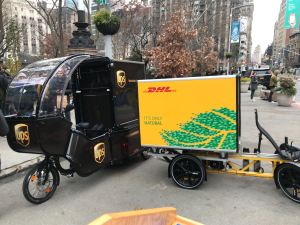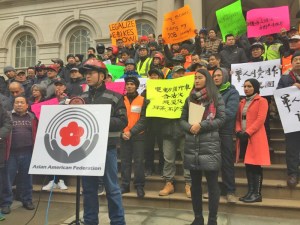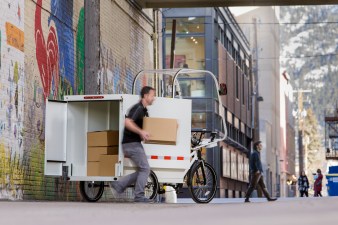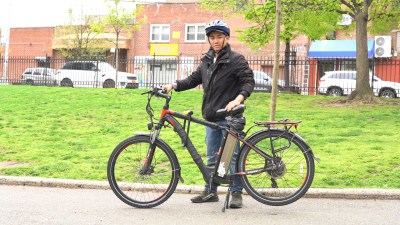OPINION: State Legislature Must Pass Jessica Ramos’s Bill to Allow for Wider Cargo Bikes
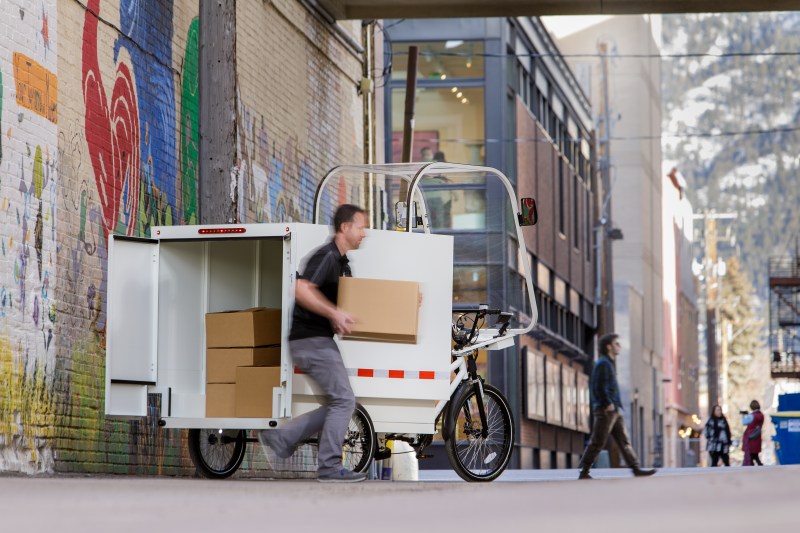
Last year, Streetsblog reported on a State Senate bill that would allow for wider electric bikes as a way of fostering the nascent cargo e-bike industry, which cannot operate safely and at scale if bikes are limited to 36 inches wide, as they currently are by law. The Senate bill is expected to pass, but who knows what will happen in Albany, what with the governor being the governor — and the legislature still figuring out how to work (or not work) with him? The Assembly version of the bill passed the Transportation Committee unanimously earlier this week with a 55-inch-width maximum (though there is talk that the cap might be narrowed to 48 inches, which conforms to worldwide standards). The following is an op-ed in support of the bill to raise the width limit to 48 inches.

Currently, there is an arbitrary state law that effectively prohibits cargo e-trikes by restricting their width a maximum of 36 inches. For safety and practicality reasons, however, e-trikes are generally 48 inches wide — the extra width makes them stable, increases maneuverability and provides riders with better visibility. Those extra 12 inches are all that’s standing in the way of meaningful progress in solving a massive pain point throughout New York City. Those extra 12 inches are necessary for this industry to take off.
At Coaster Cycles, we build fleets of e trikes that help Fortune 500 companies, government agencies and small retailers move your prepared food, groceries and all flavors of small freight through cities in an e?cient and eco-friendly manner. Our mission is to replace delivery trucks and vans to reduce congestion and eliminate their harmful carbon dioxide emissions.
A typical New York City household receives one to two package deliveries per week, or a total of about 500 million packages per year. In many cases, these deliveries are consumer goods such as electronics, books and clothes, but they’re also now pandemic essentials – food, groceries and more. Many large cities like Los Angeles, San Francisco, Chicago and others around the world are replacing delivery trucks with cargo trikes — and they’re much better o? for it.
Cargo trikes have a slow but powerful motor designed to carry about 400 pounds over a variety of terrain and topographies and are far more nimble than trucks or vans, making it easier to get into and out of delivery locations without clogging tra?c or parking. E-trikes are also cleaner. According to the results of a pilot program conducted by New York City Department of Transportation, e-trikes can replace trucks or vans on a 2:1 or even 1:1 basis, covering 20 service miles per day.
For each trike that replaces a truck, carbon dioxide emissions are reduced by seven tons per year – the equivalent of planting 100 trees. And e-trikes can be better for business as they’re about three times more profitable than trucks and vans, according to a Harvard study in London.

Fortunately, State Sen. Jessica Ramos (D-Queens) and Assembly Member Chantel Jackson (D-The Bronx) have proposed legislation that would allow electric bicycles up to 55 inches wide, as reported by Streetsblog. If this legislation (or even a version that caps bikes at 48 inches, which is a worldwide recognized standard) becomes law, we believe it would be possible to put 500 to 1,000 American-made cargo e-trikes on the road within 12 months of being enacted. This would remove at least 500 delivery trucks from New York City’s streets resulting in less congestion, quieter city blocks and cleaner air for everyone.
Imagine a world where there’s no noise pollution from trucks “beep beep beeping” as they back up, where bike lanes aren’t blocked and cyclists don’t have to swerve into traffic, where sidewalks are clear of pallets of packages that impede pedestrians, where the air is noticeably cleaner to breathe and where streets are safter, helping the city meet its Vision Zero goal. There is a better way, but the state Legislature must first modify this arbitrary law and allow for wider and safer e-cargo trikes for deliveries.
Ben Morris is the CEO and founder of Coaster Cycles, which manufactures bikes in Montana. The company has no relationship with Streetsblog.
